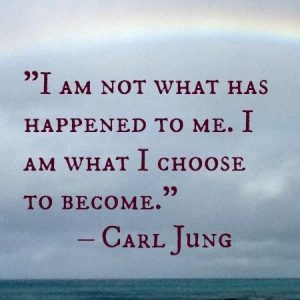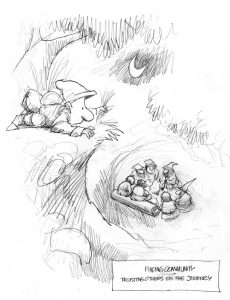The Heroic Journey
The Heroic Journey – From Child to Young Adult
Why Is the Heroic Journey Story So Important to My Identity?
The biggest reason is that it simply takes time to develop your own authentic identity as a young woman or man. It really is a journey with lots of ups and downs, experiments and discoveries and experiences with a whole variety of people (some helpful and some not).
Knowing what to expect on this journey doesn’t take away all the difficulties, but it does arm you to know what’s normal and to be better prepared to figure out how to deal with it. Here are how the basic elements of a heroic journey look in terms of developing an identity.
Being the Author of Your Identity
Taking Responsibility for Your Life – Leaving Childhood Behind
Letting go of your child identity and developing your identity as a young woman or young man is a central part of that journey.
The heroic journey is all about being the author of a life and we go through lots of large and small journeys over a lifetime (lots of changes and development). Being the author of a life is always the challenge, but the teen years are where it comes center-stage and where it can be the most intense.
You Are Thrown Into the Journey – You Didn’t Ask For it
You did not ask for this journey. You got thrown into it by your body, which is following the natural path of transforming from a child to an adult – physically, intellectually, emotionally and spiritually. As a teenager, you get thrown out of your old identity as a child and into a journey that will last quite a while and challenge you in many ways to build your new identity as a young man or young woman.
The trick is to say, “OK, I got thrown into this teenage journey, but I am now going to start taking charge of the experience (being the author).” You can’t stop or control the journey, but you can dramatically influence how it plays out – as you become more and more of the author of the experience and feel more of a call to become a young adult.

The Three Types of Tests to be Faced
In developing your identity as a young man or woman you face all three of the classic types of test on the heroic journey: letting go; discovery and master; and dealing with being in-between the old and the new – “inbetweenity.” There is no way around these tests as a teenager – it’s just the way it works.
You can’t just continue with your old identity of childhood and you can’t just take a ready-made identity off the shelf and put it on. You can try, but it won’t work. So it’s a ten year journey of exploring and committing to the different elements that will form your identity.
Letting Go
We have to let go of being a child – the sense of the one to be cared for, of having limited responsibility, of being in simple relationships and of being small with few expectations of us.

Discovery
We have to discover a new identity that includes being responsible, caring for others as well as being cared for, being a worthy partner in relationships, having the set of competencies required to be an adult, etc.
“Inbetweenty”
And, we have to deal with having one foot in childhood and one foot in adulthood – for years. “Inbetweenity” is characterized by lots of conflicting thoughts and emotions: clarity and confusion, excitement and anxiety; certainty and uncertainty; hopes and fears; feeling large and powerful and feeling small and vulnerable; etc.
Connecting With Others on Your Path
In the myths throughout time the heroes never go alone. They sometimes get isolated, but eventually come back into contact with others – and there are lots of others on the path.
You will encounter companions (other teenagers you travel with during different parts of the journey), helpers and healers, teachers and wise men and women who share their wisdom, and sometimes rescuers. You will also encounter opponents and enemies, tricksters – those who would lead you off the path and those who would sell you simple answers to the complex questions of being a teenager.
Your job is to find and establish relationships with those who will support you in different ways – and to figure out how to deal with those people who would undermine you. Your support network is key – the web of relationships that will help you deal, not only with the challenge of identity, but also the challenges of developing relationships and building competencies. It may change as you go, but a support network – even a small one – is key.

Keep the Tough Times in Perspective on the Journey
This is surprisingly important for a couple of reasons. First, it’s important to remember that the teenage journey is a long one and you can’t really rush through it – the journey will unfold. Second, keep in mind that when the tough times happen, they don’t last forever. Tough times are part of life – but only one part – but when you are in the middle of a tough time it can seem to dominate everything and feel like it will last forever. It won’t. It’s just a part of the journey that is hard. As you get more experience with the emotional roller coaster of being a teenager, this gets easier to remember.
“Life doesn’t get easier or more forgiving, we get stronger and more resilient.” - Life, the Truth, and Being Free
Steve
Maraboli